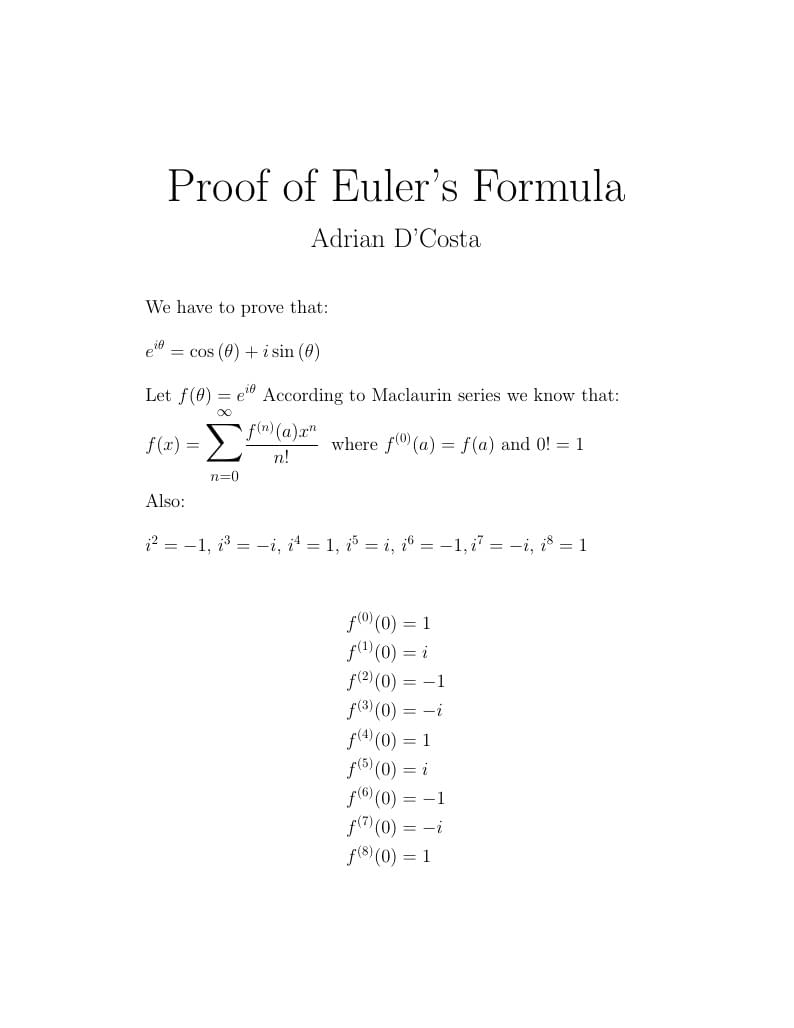
ProofOfEuler'sFormula
Author:
Adrian D'Costa
Last Updated:
8 years ago
License:
Creative Commons CC BY 4.0
Abstract:
Proof of Euler's Formula

\begin
Discover why over 25 million people worldwide trust Overleaf with their work.
Proof of Euler's Formula

\begin
Discover why over 25 million people worldwide trust Overleaf with their work.
\documentclass[14pt]{extreport}
\usepackage[english]{babel}
\usepackage[utf8x]{inputenc}
\usepackage{amsmath}
\usepackage{amssymb}
\usepackage{graphicx}
\usepackage[makeroom]{cancel}
\usepackage{tabularx}
\usepackage{xcolor}
\usepackage{relsize}
\pagenumbering{gobble}
\begin{document}
{\center{\Huge Proof of Euler's Formula \par}}
{\center{\Large Adrian D'Costa \par}}
\text{ }
\newline
We have to prove that:
\newline
$\displaystyle e^{i\theta} = \cos{(\theta)} + i\sin{(\theta)}$
\newline
Let $\displaystyle f(\theta) = e^{i\theta}$ According to Maclaurin series we know that:
$\displaystyle f(x) = \mathlarger{\mathlarger{\sum}}\limits_{n = 0}^{\infty}\frac{f^{(n)}(a)x^n}{n!}\,\, \text{ where } f^{(0)}(a) = f(a) \text{ and } 0! = 1$
\newline
Also:
\newline
$i^{2} = -1,\, i^{3} = -i,\, i^{4} = 1,\, i^{5} = i,\, i^{6} = -1, i^{7} = -i,\, i^{8} = 1$
\newline
\begin{align*}f^{(0)}(0) &= 1\\ f^{(1)}(0) &= i\\ f^{(2)}(0) &= -1\\f^{(3)}(0) &= -i\\ f^{(4)}(0) &= 1\\ f^{(5)}(0) &= i \\ f^{(6)}(0) &= -1\\f^{(7)}(0) &= -i\\ f^{(8)}(0) &= 1\end{align*}
$\displaystyle e^{i\theta} = \frac{1}{0!} + \frac{i\theta}{1!} - \frac{\theta^{2}}{2!} - \frac{i\theta^{3}}{3!} + \frac{\theta^{4}}{4!} + \frac{i\theta^{5}}{5!} - \frac{\theta^{6}}{6!} - \frac{i\theta^{7}}{7!} + \frac{\theta^{8}}{8!} + ...$
\newline
Now to find Maclaurin series representation of:
\newline
$\displaystyle g(\theta) = \cos{(\theta)}$
\newline
\begin{align*}g^{(0)}(0) &= \cos{(0)} = 1\\ g^{(1)}(0) &= -\sin{(0)} = 0 \\ g^{(2)}(0) &= -\cos{(0)} = -1 \\ g^{(3)}(0) &= \sin{(0)} = 0 \\ g^{(4)}(0) &= \cos{(0)} = 1 \\ g^{(5)}(0) &= -\sin{(0)} = 0 \\ g^{(6)}(0) &= -\cos{(0)} = -1 \\ g^{(7)}(0) &= \sin{(0)} = 0 \\g^{(8)}(0) &= \cos{(0)} = 1 \end{align*}
$\displaystyle \cos{(\theta)} = \frac{1}{0!} - \frac{\theta^{2}}{2!} + \frac{\theta^{4}}{4!} - \frac{\theta^{6}}{6!} + \frac{\theta^{8}}{8!} + ...$
\newline
Maclaurin series representation of:
\newline
$\displaystyle h(\theta) = \sin{(x)}$
\newline
\begin{align*}h^{(0)}(0) &= \sin{(0)} = 0\\ h^{(1)}(0) &= \cos{(0)} = 1 \\ h^{(2)}(0) &= -\sin{(0)} = 0 \\ h^{(3)}(0) &= -\cos{(0)} = -1 \\ h^{(4)}(0) &= \sin{(0)} = 0 \end{align*}
\begin{align*} h^{(5)}(0) &= \cos{(0)} = 1 \\ h^{(6)}(0) &= -\sin{(0)} = 0 \\ h^{(7)}(0) &= -\cos{(0)} = -1 \\h^{(8)}(0) &= \sin{(0)} = 0 \end{align*}
\newline
$\displaystyle i\sin{(\theta)} = \frac{i\theta}{1!} - \frac{i\theta^{3}}{3!} + \frac{i\theta^{5}}{5!} - \frac{i\theta^{7}}{7!} + ...$
\newline
Now:
\newline
\begin{align*}\cos{(\theta)} + i \sin{(\theta)} &= \frac{1}{0!} - \frac{\theta^{2}}{2!} + \frac{\theta^{4}}{4!} - \frac{\theta^{6}}{6!} + \frac{\theta^{8}}{8!} + \frac{i\theta}{1!} - \frac{i\theta^{3}}{3!} + \frac{i\theta^{5}}{5!} - \frac{i\theta^{7}}{7!} + ... \\ &= \frac{1}{0!} + \frac{i\theta}{1!} - \frac{\theta^{2}}{2!} - \frac{i\theta^{3}}{3!} + \frac{\theta^{4}}{4!} + \frac{i\theta^{5}}{5!} - \frac{\theta^{6}}{6!} - \frac{i\theta^{7}}{7!} + \frac{\theta^{8}}{8!} + ... \\ &= e^{i\theta} \end{align*}
\newline
\text{[Q.E.D.]}
\newline
\section{Another way to prove Euler's formula}
Another way to prove Euler's formula is that:
$\displaystyle \cos{(\theta)} + i \sin{(\theta)} = e^{i\theta}$
\newline
Now rearranging that equation we get:
\newline
$\displaystyle 1 = \frac{e^{i\theta}}{\cos{(\theta)} + i \sin{(\theta)}}$
\begin{align*}0 &= \frac{d}{d\theta}\left(\frac{e^{i\theta}}{\cos{(\theta)} + i\sin{(\theta)}}\right).....\text{[Taking der. of both sides]} \\0 &= \frac{ie^{i\theta}\cos{(\theta)} - e^{i\theta}\sin{(\theta)} + e^{i\theta}\sin{(\theta)} - ie^{i\theta}\cos{(\theta)}}{\cos^{2}{(\theta)} + 2 i \cos{(\theta)}\sin{(\theta)} - \sin^{2}{(\theta)}}\\ 0 &= \frac{0}{\cos^{2}{(\theta)} + 2 i \cos{(\theta)}\sin{(\theta)} - \sin^{2}{(\theta)}}\\ 0 &= 0 \\ L.H.S &= R.H.S \end{align*}
\text{[Q.E.D.]}
\end{document}